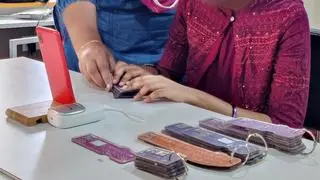Suresh credits his perseverance and doggedness as an entrepreneur to valuable life lessons he learnt after he had completed his school in the 1990s. He candidly says he was not even aware that there was an entrance examination for admission into engineering college. He and his father tried getting admission in a private medical college, but the capitation fee was so high that his father felt it was not worthwhile pursuing. Instead, his father suggested to Suresh that he run the real estate business that he did part-time, after completing his day’s work as an insurance company employee.
He grudgingly went ahead and immersed himself in the real estate job, running to police stations and courts to either file complaints or pursue a case. “That,” says Suresh, “gave me tremendous amount of street knowledge that none of my friends have. After 20-25 years now, what made me what I am today are those real field and street experiences.”
He credits his father with something else that has stood him in good stead in his journey as an entrepreneur. His father, before setting out for work, would prepare a list of tasks that Suresh had to complete during the day. He was systematic and methodical that he would have a checklist of things to do every day, Suresh reminisces, sitting in his office in Tidel Park, situated on Chennai’s IT corridor. “That built a lot of systems and processes and how to approach things,” Suresh says.
The turning point
Suresh recalls with a hearty laugh that he and his friends decided to enrol in a typewriting institute, which he says was the hang-out place for most teenage boys in a small town. Soon enough the owner of the typewriting institute bought a computer and told the boys that by paying a little extra, they could use the computer. This, says Suresh, was the turning point in his life. “I realised this is my career and not real estate. I slowly dropped out of real estate work and started spending more time on this.”
Suresh even spent quite a lot of money on buying computer books, for which he had to go to Puducherry. One thing led to another and Suresh soon himself starting a computer training institute in Cuddalore with some partners. Not only did he train students on the basics of computers, Suresh taught himself various aspects of programming and wrote the code for a programme, which, he found to his total surprise, actually worked. He was in seventh heaven.
After running the computer training institute for about three years, Suresh decided that he had to work in the IT industry, for which he moved to Bengaluru. He got a job in HP and then joined a company called Selectica in Chennai, where he was in charge of product engineering.
Technical knowledge
Those eight years he spent in HP and Selectica gave Suresh sound technical knowledge and helped hone his management capabilities. That was when he decided to become entrepreneur again, when in 2004 he founded OrangeScape. He had extensive knowledge in rule-based computing and his idea with OrangeScape was to democratise rule engine so that even those without technical knowledge or capability could use it. Their product, Dimension, found its first customer in the Chennai-based auto components maker Rane group. The core value proposition of that product was customers could convert a spreadsheet into a working application on the web, without having to be a programmer. Though they made some progress with the product, Suresh soon found that there were not too many companies that could afford it. There was also a paradigm shift that was happening, which was that things were moving to the cloud and the client-server model was dying a slow death. OrangeScape then shifted to visual PaaS (platform as a service), in the belief they had to do a technology transition. Looking back, Suresh is honest about the mistakes they made. “The first time we made a technology mistake and then there was a market shift.”
OrangeScape had raised $1 million from angel investors, towards the end of 2011. Suresh was in the US to develop the market, but found it had collapsed. All the money had been spent, the market was not there and a colleague from Selectica, who was also a co-founder at OrangeScape, decided to leave. That year, 2013, was a crisis year for the company, Suresh recalls.
He was not ready to call it quits. He found that a customer of theirs was using their platform, spending money on it to build a sleek UI and a workflow management system. This was one of the cases the platform, which was a generic platform, supported. That was the trigger for OrangeScape’s third product – KiSSFLOW -- a workflow management software that it launched in 2013. This has turned out to be profitable. There was even a move to integrate this as part of Google’s G Suite, which unfortunately didn’t happen.
Keep it simple stupid
KiSSFLOW stands for Keep it Simple Stupid. It was so easy to use that there was no need for any technical knowledge. Companies can build their workflow systems using it. For instance, there are multiple approvals required for sanctioning a purchase of a computer or granting leave to staff. All this can be built on the software product by the companies themselves.
“At the simplest level,” explains Suresh, “you can create a process that allows people to apply for leave and get it approved by their manager, communicated to the HR. The entire approval lifecycle management can be done. Others can use it for purchase automation.” Suresh decided to target small and medium businesses with KiSSFLOW, which is always on the cloud. It is a subscription model that OrangeScape follows. Suresh says the company’s revenue will be under $10 million and it has been profitable for three years now.
KiSSFLOW has about 10,000 customers, including big names such as Michelin, Disney, NBC and Reckitt Benckiser, in over 160 countries, each one using it for a specific purpose. Nearly half the customers are in the US, a fifth in Europe and less than a tenth in India. “We are targeting the mid-market, SMB space. We are doing a cloud-based, easy to use, self-service based software which is affordable,” says Suresh. Wait and watch, he says, when asked if there are new products in the pipeline.









Comments
Comments have to be in English, and in full sentences. They cannot be abusive or personal. Please abide by our community guidelines for posting your comments.
We have migrated to a new commenting platform. If you are already a registered user of TheHindu Businessline and logged in, you may continue to engage with our articles. If you do not have an account please register and login to post comments. Users can access their older comments by logging into their accounts on Vuukle.